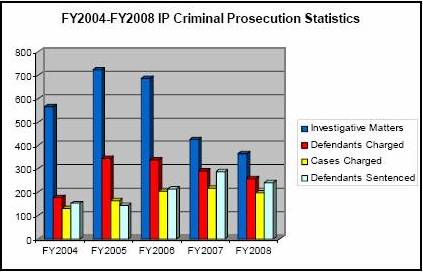The PRO-IP Act's First Year: Surprisingly, Investigations and Convictions Declined

All the way from Denmark, the Innovationpartners blog put me onto the Justice Department’s first annual report of the PRO-IP Act. Some may remember the Act’s 2008 enactment (STL posts here and here), which was aimed at slowing counterfeiters, copyright infringers, and other IP wrongdoers.
So how’d it do in its first year?
When compared with FY2007, FY2008 saw fewer investigative matters received by Assistant U.S. Attorneys (to 365 from 426), fewer defendants charged (to 259 from 290), fewer cases charged (to 197 from 217), and fewer defendants sentenced (to 242 from 287). The number of convicted of IP crimes sentenced to 60+ months also decreased (to 3 from 16).
Doesn’t seem like a banner year.
However, it wasn’t all bad. The report credits efforts under the Act for seizing 38,000 tablets of counterfeit Viagra in one bust, 75,000 counterfeit Viagra and Cialis tablets in another, and 500,000 tubes of counterfeit toothpaste in another. Fake cancer drugs and oil pipeline couplings also were seized. Sellers of a lot of counterfeit software were put out of business (mostly selling on eBay), and one gentleman was convicted of selling pirated teleradiological software to hospitals.
There’s also an interesting update on U.S. efforts under the Act worldwide, including reports on China (“A substantial percentage of all counterfeit and pirated goods originate in China.”), Brazil (“It has suffered the effects of IP crime as both counterfeit products and pirated versions of copyrighted works directly impact its citizens and its creative industries.”), and other target countries.
All in all, it’s not a bad read. I’m just a little surprised the stats weren’t better. Hopefully, we’ll see some improvement next time around.
Reader Comments